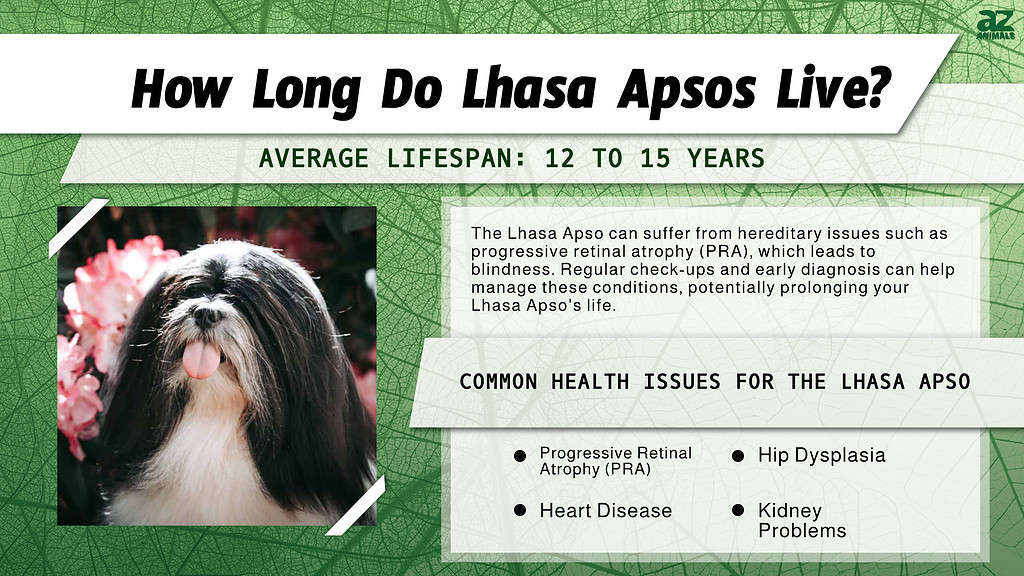
The Origin of Lhasa Apsos
Known for its devotion, keen watchfulness, and unyielding character, the Lhasa Apso is a small yet resolute breed that hails from the rugged terrain of the Himalayas. This breed’s history is deeply involved in religious and cultural significance, with its beginnings deeply intertwined with Tibetan monastic life.
The name’ Lhasa Apso’ is derived from Tibet’s holy city, Lhasa, and the term ‘Apso,’ which in the Tibetan dialect refers to a long-haired, bearded lion-like dog. This breed is associated with the mythical snow lion, an emblem of Tibet.
From their early beginnings, Lhasa Apsos were sacred dogs. They were bred in Tibetan monasteries to act as indoor watchdogs, alerting monks to any intruders. Despite their small stature, their keen perception and acute hearing made them excellent guardians. The breed was not just a pet; they were spiritual sentinels, often believed to carry the souls of deceased lamas who hadn’t yet reincarnated into their next life.
Lhasa Apsos Breed Qualities
Physically, Lhasa Apsos are known for their distinctive coat of dense, long hair, which falls over their dark, expressive eyes. Traditionally their long fur acted as insulation against the harsh Tibetan winters and the blazing sun. Their color varies widely, including shades of black, white, gold, cream, and a mix of these. They stand about 10 to 11 inches tall and weigh between 12 and 18 pounds.
This breed is renowned for its independent spirit and intelligent disposition. Lhasa Apsos are known to be assertive, confident, and steadfast, requiring a calm, patient hand for training. Despite their aloofness with strangers, they form strong bonds with their families, displaying a deep sense of loyalty and affection.
The Lhasa Apso is a distinctive, resilient, and charismatic breed. They symbolize Tibet’s rich cultural and spiritual history, imbued with a captivating blend of religious significance, distinctive physical attributes, and compelling character traits.
But one question that often intrigues owners and prospective pet parents alike is, “How long do Lhasa Apsos live?” Let’s delve into this topic, exploring their lifespan, key factors influencing longevity, and ways to ensure optimal health and happiness.
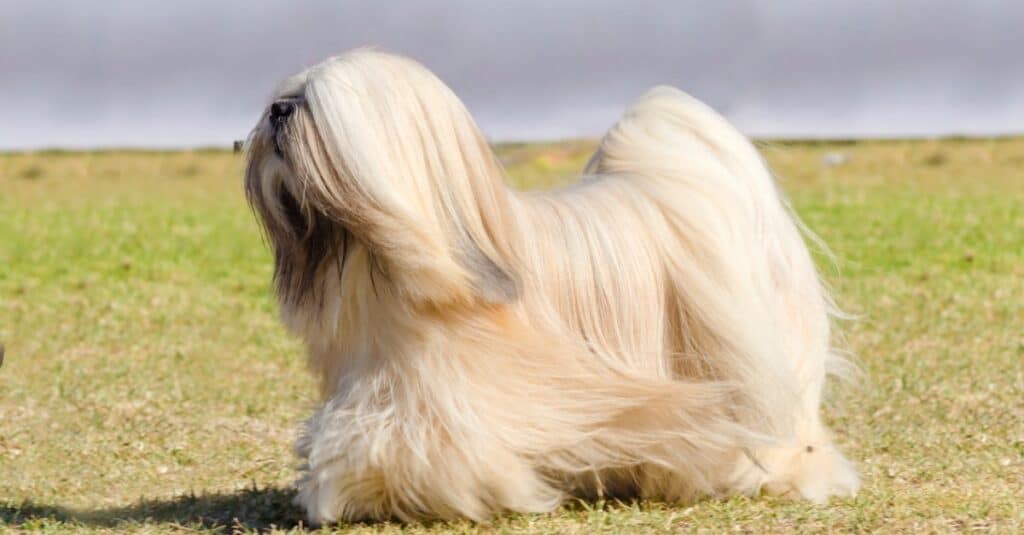
Lhasa Apsos live, on average, between 12 to 15 years old.
©iStock.com/f8grapher
How Long Do Lhasa Apsos Live?
On average, Lhasa Apsos boast an impressive lifespan of 12 to 15 years. This life expectancy is reasonably long compared to other breeds, considering that small to medium-sized dogs generally tend to live longer than their larger counterparts. However, it’s not unheard of for Lhasa Apsos to surpass this average, with some dogs reaching the remarkable age of 17 or even 18 years.
Lhasa Apso’s long life is due to several factors, including its robust genetic heritage and adaptable nature. Prominent traits in their breeding include endurance and resilience, which contribute to their longevity. Nonetheless, genetics alone does not guarantee a long life; several other factors also play a crucial role, which we will explore later in this article.
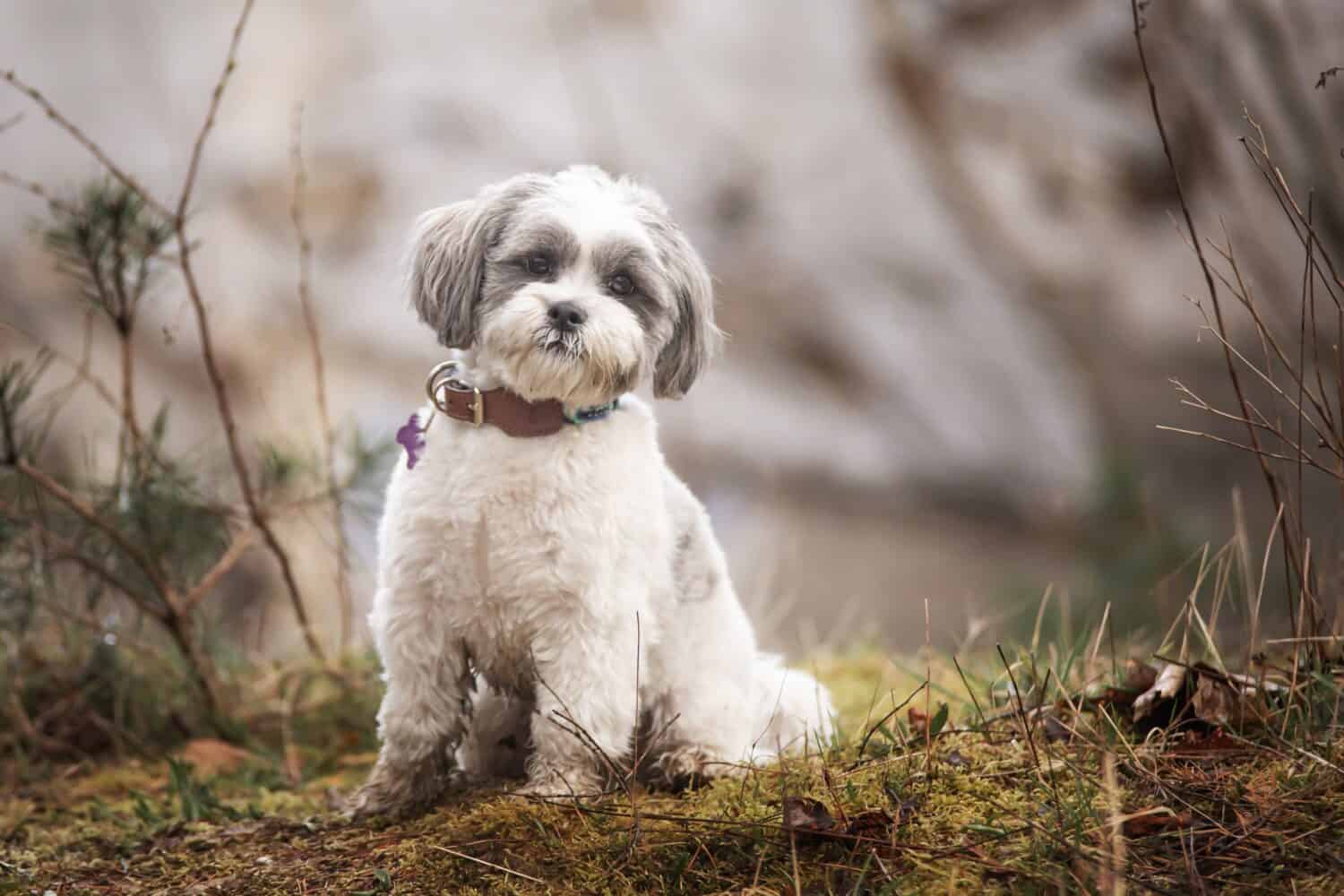
Lhasa Apsos stand about 10 to 11 inches tall and weigh between 12 and 18 pounds.
©Gertrude Goene/Shutterstock.com
Lhasa Apsos Lifespan by Mixed-Breed
An interesting aspect of this breed’s demographic is the mixed-breed or crossbred Lhasa Apsos population. These hybrids, often from the Lhasa Apso bred with other small to medium-sized breeds, offers a fascinating study in dog longevity.
Research indicates that mixed-breed dogs often have a longer lifespan than purebreds, attributed to the phenomenon of hybrid vigor. This is where increased genetic diversity can lead to healthier individuals. However, the lifespan of a Lhasa Apso mix is affected by factors beyond genetics, including the specific traits of the other breed involved in the mix.
Common breeds mixed with Lhasa Apsos include the Shih Tzu, Poodle, and Maltese. Which give rise to hybrids known as the Shih Apso, Lhasapoo, and Lhasatese, respectively.
Shih Apso, the mix of a Lhasa Apso and a Shih Tzu, tends to combine the longevity of both parent breeds. And potentially leading to a lifespan ranging from 12 to 16 years. Both breeds are known for their longevity and share similar environments of origin.
The Lhasapoo, a mix between a Lhasa Apso and a Poodle, also tends to have a long lifespan. Poodles are known for their longevity. When they are bred with the robust Lhasa Apso, the lifespan of this crossbreed is around 12 to 15 years.
Lhasatese, a combination of the Lhasa Apso and Maltese, similarly carries the potential for a long lifespan, given that the Maltese breed also falls into the category of long-lived breeds.
Lhasa Apso mixed breeds, such as the Shih Apso, Lhasapoo, and Lhasatese, often enjoy long lifespans. As they are influenced by the longevity traits of both parent breeds. Ensuring optimal health for these crossbreeds entails a combination of genetic potential, a nurturing environment, and diligent care.
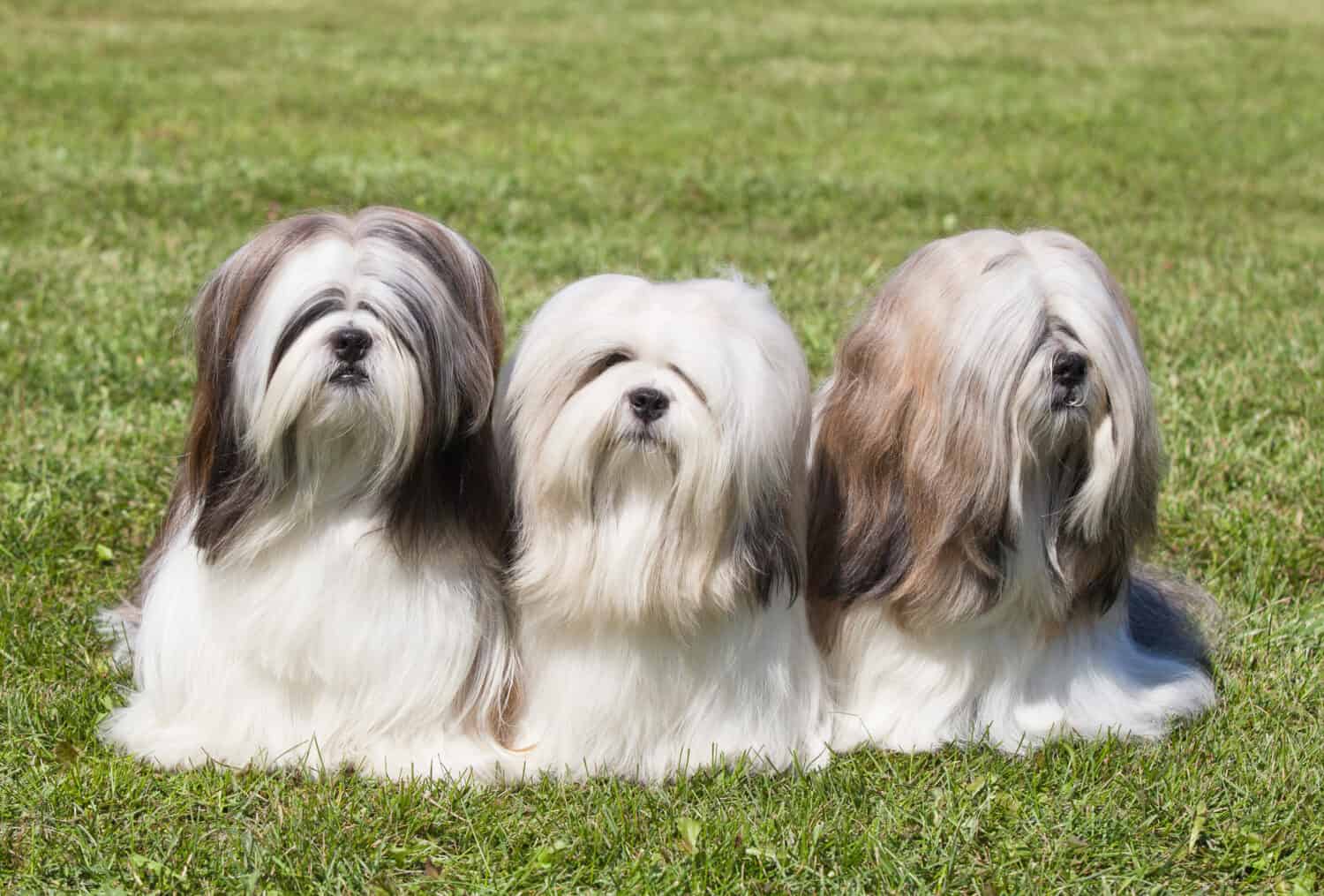
Lhasa Apsos mixed breeds commonly include the Shih Tzu, Poodle, or Maltese.
©VKarlov/Shutterstock.com
How Old Was the Oldest Lhasa Apsos Ever to Live
There are numerous accounts of Lhasa Apsos reaching up to 20 years. With rare instances of some individuals living even longer.
Though unverified by an official record, the oldest Lhasa Apso was born in 1910 and passed away in 1939. This dog would have lived roughly 29 years, which is impressive, to say the least.
The factors contributing to the extended lifespan of some Lhasa Apsos are diverse and complex. Genetics certainly play a part in the breed’s Tibetan origins. Implying a history of survival in harsh climates, which may have conferred resilience and longevity. While it is difficult to pinpoint the exact age of the oldest Lhasa Apso due to a lack of official records, there’s no question about the breed’s propensity for long life. Lhasa Apsos have lived into their late teens and even early twenties.

The oldest Lhasa Apsos was said to have lived 29 years.
©aurelie le moigne/Shutterstock.com
6 Factors That Impact Lhasa Apsos Lifespan
Like any pet, various factors can influence a Lhasa Apso’s lifespan. In order to provide them with a long, healthy, and fulfilling life, it’s crucial to understand these factors and how they interact.
1. Underlying Health Issues
One of the most significant factors affecting a Lhasa Apso’s lifespan is its health status. Like all breeds, Lhasa Apsos are prone to certain health conditions. They can suffer from hereditary issues such as progressive retinal atrophy (PRA), which leads to blindness. As well as hip dysplasia, a condition that affects the joints. Regular check-ups and early diagnosis can help manage these conditions, potentially prolonging your Lhasa Apso’s life. Working with a reputable breeder who tests for these conditions in their breeding dogs is essential to ensure the healthiest possible puppies. Regular veterinary check-ups are also vital. Due to their longer life expectancy, Lhasa Apsos may be more prone to age-related health issues. These health issues include heart disease and kidney problems. Therefore, annual vet visits are also important to catch any of these potential issues early.
2. Spaying and Neutering
Spaying and neutering are common practices that can also influence a Lhasa Apso’s lifespan. Spayed and neutered dogs generally live longer, healthier lives, partially because these procedures prevent certain health issues. For example, spaying a female Lhasa Apso helps prevent uterine infections and breast cancer, which is fatal in about 50% of dogs.
3. Exercise and Stimulation
Exercise is crucial for Lhasa Apso’s health and longevity. These spirited dogs need regular physical activity to maintain a healthy weight and overall health. Lack of exercise can lead to obesity. This puts unnecessary strain on their joints and can contribute to health problems such as diabetes and heart disease. Mental well-being is often overlooked. But it is just as crucial for a Lhasa Apso’s life expectancy as it reduces the risk of behavioral problems. These intelligent and independent dogs thrive on mental stimulation through training, play, and social interaction.
4. Diet
A balanced diet is fundamental to Lhasa Apso’s health and longevity. These dogs need high-quality food suited to their size, age, and activity level. Feeding them a diet rich in proteins, fats, vitamins, and minerals supports their immune system, and promotes a healthy coat. It also helps them maintain a healthy weight. Owners should always provide fresh water and avoid feeding their pets human food. As human food can lead to obesity and other health issues.
5. Environment
The environment in which a Lhasa Apso lives can significantly impact its lifespan. A safe, comfortable living environment free from hazards like toxic plants and chemicals is crucial. It’s also important to consider the climate, as Lhasa Apsos are well-suited to colder temperatures due to their Tibetan heritage. Extreme heat can lead to overheating and related health issues.
6. Love and Attention
Finally, never underestimate the power of love and companionship! Lhasa Apsos are social creatures that thrive on attention and affection. A loving home can significantly improve their mental well-being, contributing to overall health and longevity. A stressed or lonely dog can develop behavioral issues and stress-related health problems. By providing your Lhasa Apso with love, attention, and mental stimulation, you can contribute to a happier, healthier, and longer life.
Every pet, including Lhasa Apsos, has unique needs and characteristics. Understanding the influence of underlying health issues, the benefits of spaying and neutering, the importance of regular exercise and a balanced diet, the effect of their environment, and the impact of love and care on their well-being is crucial for their longevity. With careful consideration of these factors, pet owners can contribute to their Lhasa Apso’s quality of life and longevity. And ensuring they remain a beloved part of their family for many years. This harmonious relationship between a Lhasa Apso and its owner leads to a longer life for these small, hardy dogs. It enriches the lives of the humans lucky enough to call them a companion. After all, owning a Lhasa Apso is not just about extending its lifespan but also about improving it. And making every moment they live healthy, happy, and truly fulfilling.
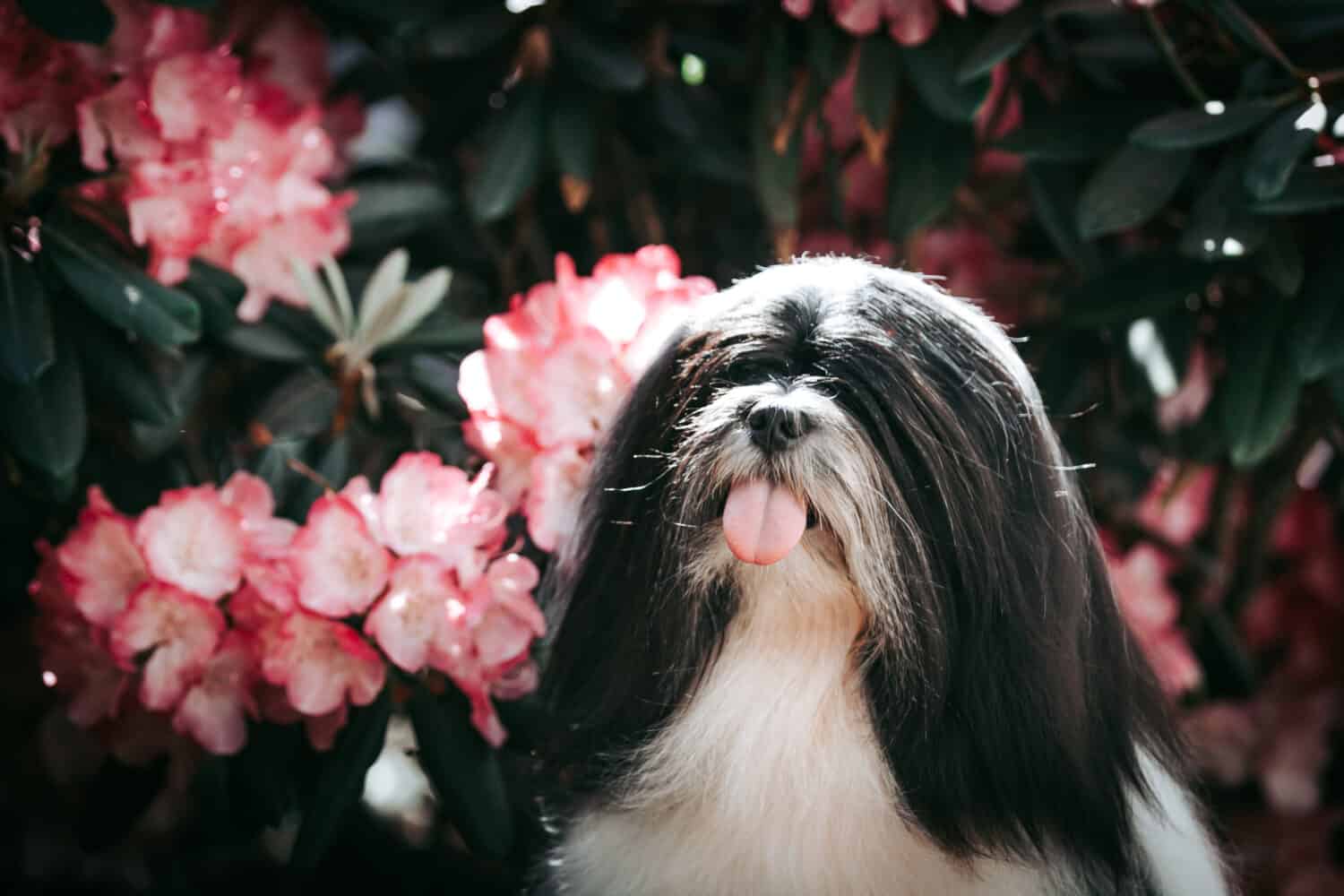
Lhasa Apsos are loyal dogs who fiercely love their owners.
©Eve Photography/Shutterstock.com
In Conclusion
In homes worldwide, Lhasa Apsos have captured the hearts of dog lovers with their unique mix of charm, energy, and resilience. Their longevity, often reaching into the early teens and sometimes even the early twenties, adds to the allure of this hardy breed. While genetic factors naturally influence their lifespan, it’s essential to remember the significant role we, as pet owners, play in our Lhasa Apsos’ lives.
Quality Matters
We’ve explored the impacts of underlying health issues, such as progressive retinal atrophy and hip dysplasia. Early diagnosis and regular health checks are crucial for managing these conditions and ensuring the ongoing health of your Lhasa Apso. Breeding practices also play a role, with reputable breeders testing for these conditions to ensure the healthiest possible puppies.
Spaying and neutering are proven to increase overall lifespan. As they prevent certain health conditions, such as uterine infections and breast cancer. These procedures, combined with regular veterinary care, contribute significantly to a Lhasa Apso’s health and longevity.
Nutrition and exercise are also vital for a Lhasa Apso’s lifespan. A balanced diet with high-quality dog food and regular physical activity helps maintain a healthy weight and reduces the risk of obesity-related issues like diabetes and heart disease.
Often overlooked are environment and emotional care, but they are equally important factors. Lhasa Apsos thrive in safe, comfortable environments that match their climatic preferences. Similarly, emotional well-being plays a pivotal role in their overall health. Like us, Lhasa Apsos need lots of love, attention, and mental stimulation to lead a healthy and fulfilling life.
In summary, while a Lhasa Apso’s Tibetan lineage provides a natural gift of longevity, it’s the combined effort of careful breeding, health management, balanced nutrition, adequate exercise, a suitable environment, and a whole lot of love that truly unlocks their potential for a long, healthy life. By understanding and implementing these factors, we can enhance their lifespan and quality of life. Making each moment of their life as joyful and fulfilling as possible.
The photo featured at the top of this post is © iStock.com/xyom
Ready to discover the top 10 cutest dog breeds in the entire world?
How about the fastest dogs, the largest dogs and those that are -- quite frankly -- just the kindest dogs on the planet? Each day, AZ Animals sends out lists just like this to our thousands of email subscribers. And the best part? It's FREE. Join today by entering your email below.
Thank you for reading! Have some feedback for us? Contact the AZ Animals editorial team.






